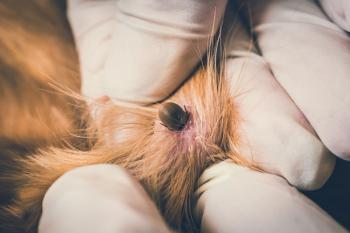
Rocky mountain spotted fever (Proceedings)
RMSF caused by Rickettsia rickettsii is an acute systemic disease of dogs and humans. RMSF is generally seasonal (Apr.-Sept.) correlating with the Dermacentor sp. lifecycle.
Rocky Mountain Spotted Fever (RMSF)
RMSF caused by Rickettsia rickettsii is an acute systemic disease of dogs and humans. RMSF is generally seasonal (Apr.-Sept.) correlating with the Dermacentor sp. lifecycle.
Signs
Thrombocytopenia is the most common hematological abnormality (>85%). The degree of thrombocytopenia ranges from moderate (≈ 75,000plt/ul) to severe (< 5,000 plt/ul). The major mechanism is consumption secondary to vasculitis, but there is some evidence for immune mediated destruction. Leukocytosis is the second most common hematological finding. The degree of leukocytosis can be severe (> 50,000WBC/ul), and tends to increase along with the duration of the disease. RMSF is not known to commonly cause immune mediated hemolytic anemia, but the clinical picture can be confusing due to the presence of concurrent anemia and hyperbilirubinemia. The anemia associated with RMSF is often mild (PCV 25-30%). The hematological effects are rarely seen without accompanying clinical signs, such as fever, lethargy, anorexia, pain, petechia, jaundice and neurologic signs. Common biochemical abnormalities identified in dogs with RMSF included hypoalbuminemia, hyponatremia and hyperbilirubminemia.5
Diagnosis
Serology is very helpful in the diagnosis of RMSF. If the signs are acute, then paired acute and convalescent (2-4 weeks after the acute) titers must be submitted. A four-fold change is diagnostic for an active infection. If the patient is sick ≥ 10-14 days, then a single high titer (≥ 1:1024) is consistent with an active infection. Positive Immunofluorescence of skin biopsies or positive nested PCR results also indicates active infection. Response to therapy (doxycycline, tetracycline, enrofloxacin, or chloramphenicol) is suggestive, but not diagnostic.
Treatment
Doxycycline (5mg/kg BID or 10mg/kg Q24), chloramphenicol (15-30mg/kg TID), and enrofloxacin (5mg/kg BID) for 2 weeks are effective treatments. Resistance has not been reported, so if signs persist after treatment an alternative diagnosis should be considered. Doxycycline deficiency is the primary reason for patients with RMSF to die!!!
Follow-up
An accurate diagnosis is important, since the dog can serve as a sentinel for human infections, so a convalescent titer is indicated even if the animal has responded to treatment. Resistant RMSF has not been reported.
Zoonosis
Casual contact should not pose a major risk, but direct exposure is a potential. Also, common vector transmission is possible (sentinel).
Cats do not appear to be susceptible to RMSF.
References
Statistics regarding HUMAN RMSF cases ( from
Newsletter
From exam room tips to practice management insights, get trusted veterinary news delivered straight to your inbox—subscribe to dvm360.




